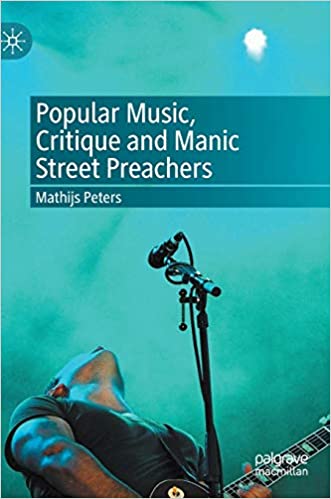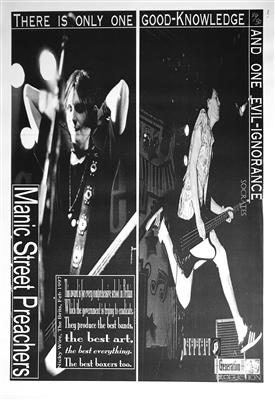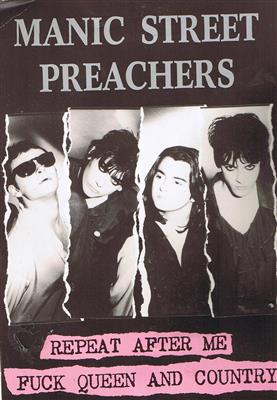
|
Since writing this review, I have emailed Mathijs Peters to complete an interview which you can find here. Not only has our discussion shown him to be totally genuine, enthusiastic, patient, engaging and charming, but he has also justified and explained some of my reservations about the book which I mention below. I have, however, decided not to rewrite the review, as I feel that these points and opinions may still be relevant to many fans. Popular Music, Critique and Manic Street Preachers ----- One thing I have discovered over lockdown is that there is a thing called Popular Music Studies. This is where academics (presumably) get paid to push around lots of long words over pages and pages and pages, citing all sorts of other learned philosophers, creators and critics, to let you know what you probably knew already about your favourite punk rock band. I'm in two minds about this discovery. On the one hand I think, isn't it about time our music, our culture, our lives were taken seriously and given some sort of respect? If people can make a living analysing, explaining and bigging up classical music, sculpture, ballet, opera and other forms of so called high or serious art, then why shouldn't the same seriousness be applied to punk, grime and hip hop? On the other hand, I agree with radical poet Tim Evans when he describes much of this industry as being in “the worst tradition of academic obfuscation, so that you take music which is of the streets, of the people, and then mystify it so that most of the people of the streets (who produce it) won’t have a clue what you’re talking about”. While libraries give us power, and working class education is of course central to the band's ethos, which books best repay us getting them off the shelves? Do gig going, record buying, music living fans really need great big tomes and pages of notes and cross references, citations and annotations, to prove that the likes of The Manics, The Clash, Bob Dylan, Bob Vylan, IDLES, The Redskins and Public Enemy have fought the power, and continue to inspire others to do the same? ----- First up, respect to Mathijs Peters for all the obvious time, dedication and love put into this book. He is clearly a massive fan of the band (he was one of the people behind the incredibly literate, encyclopedic and invaluable Dutch website Manics.NL) and it is brilliant to see the band given some of the academic analysis their work warrants. Of course, they are a band who demands such treatment; despite a history which could encourage sensationalist tabloid hacks, they have actually inspired very thoughtful and articulate writing, including the three way collaboration 'Triptych', David Evans' impressive 'The Holy Bible' and of course Simon Price's definitive (if tragically out of date) 'Everything'. However, Peters seeks to go far beyond these titles by arguing for the subversive possibility of lyrics in popular music, and the particular success of MSP in exploiting this possibility over the span of their career so far.
Peters uses the framework provided by post war German philosopher Theodor W. Adorno to anchor his analysis. Peters acknowledges that this is a controversial choice as Adorno himself was mostly dismissive of popular music, feeling that it is “unable to resist the standardising machinery of consumption culture.” I'd go further and suggest that, ensnared in an era which saw the rise of both Hitler and Stalin, Adorno was actually very pessimistic, almost sneering, in his attitudes to the potential of ordinary people, and their culture, to challenge the status quo. Peters makes his choice to use Adorno's methodology as he feels that this explains best how artists in general, and The Manics in particular, are able to use their work to create 'critical models' with which to formulate a social and political critique, and to do so while being aware of the disabling constraints imposed by their choice of media. Using this approach he is able to identify a variety of critical models used by The Manics across their work to date, and he explains this over eight exhaustive and detailed chapters. Fans will appreciate his impressive, scrupulous and revealing analysis of music, sleeve art, body-art, video-clips, clothes, interviews and performances from across the band's career. He uses these non verbal references to support his case for the words themselves being paramount in the way the MSP's work affects us; here he takes issue with other theoretical work on popular music which prioritises the semiotic effect pop songs have on us, while he prefers to stress the symbolic importance of the lyrics themselves. Semantic substance over musical emotion. While most Manics fans clearly won't need telling that with this band, lyrics, are central, they will find his analysis of these lyrics enjoyable and useful. He goes on to place the lyrics of all the band's albums released to date in the context of the critical models he develops; to do so, he carries out an in depth and careful analysis of the wide range of intertextual references in these songs, and explains how they encourage listeners to question the world in which we live. While his exploration of all the albums is painstaking and comprehensive, and is especially impressive while looking at 'The Holy Bible' and 'Generation Terrorists', much of it may not be new to fans who've read the books already cited; however, I found many of his insights into 'Journal For Plague Lovers' to be original, revealing and thought provoking. ----- All Peters' work on the lyrics reminds us of the uniquely incisive intelligence used to create them, and the wide range of references they encapsulate; as fans will know, these are not just from popular art (music, TV, films, comics, magazines and so on), but also from a wide expanse of so called high art – painting, sculpture, philosophy, religion, politics and more. These intertextual references consistently adorn Manics' lyrics, artwork, clothing, videos, set lists and so on, Peters argues, not as a form of showing off, but to encourage the listener to seek out and discover a new armoury of subversive creators, an aim which has been successful, judging from the testimony of generations of MSP fans. Reading this gave me a renewed respect for the razor-sharp, encyclopedic brains behind these lyrics, as well as for the author for being able to identify so many of these intertextual references.
Not many fans will disagree with Peters' conclusion that it is on 'The Holy Bible' that the band's lyrics create the most powerful, consistent and successful statement, a statement which he argues is a critical model in itself, for the way it uses 'the abject' as a subversive motif. He explains the abject as the reaction to horror of the world and in oneself, a horror which can lead to a breakdown in meaning even in language itself, as exemplified in the lyrics of' 'The Intense Humming of Evil' and 'Revol'. He defines the success of the album as its achievement of the "Adornian notion of a complete resistance against the status quo, coupled to a continual realisation of the futility of voicing this resistance." This is certainly one of its successes, but does it tell the whole story? ----- Peters next goes on to examine how the band's lyrical content changed once Nicky Wire became sole writer, and categorises these lyrics as being shift back towards Marxism; I would refine this as being a predominantly postmodern reading of Marxism, a reading which often implies that Resistance is Futile. Peters shows how the different post Richey album's reflect the band's fluctuating political confidence about the possibility of social change, and talks a lot about the “ghosts” which inhabit the later work of the Manics, “being haunted by history and being haunted by your own past” as Nicky Wire puts it. Is history dead and humanity (like the band) destined to live out an existence of reissues and repeats, or is there still a fresh future to fight for?
This exemplifies the biggest issue I have with the analysis of the book. While Peters of course shows how historical events influence the band's writing, he does this after examining the lyrics, while I'd have done it the other way around. As “1985” makes clear, the Manics' potent mix of working class pride, rebellion and despair was forged in that defining moment for those of our generation, the great miners strike, yet this is only mentioned in passing. Other contemporary historical events clearly leave more than a snowy footprint on their work : Blair and New Labour (and the social and artistic conservatism of Brit Pop), the Gulf War, the election of David Cameron and the rise of Trump and the Alt right, for instance. My earliest live Manics memory is from 1991 at Cambridge Junction: Nicky introducing 'Motown Junk' by yelling “come closer for this one, let's have a fucking riot!”; this on the day that there had been a public celebration of the success of the Poll Tax Riot a year earlier. Being part of the working class tradition of solidarity and struggle, and as keen politics students, the band have consistently been alternately buoyed and sunk by the successes and failures of the movement. I'd have liked greater reference to the way the ebb and flow of social and political struggles impacts on their cannon of work, and on their critical models. ----- Peters goes on to examine the shifts in the later albums towards belief in both European and Welsh solidarity as a way to escape the austerity, violence and racism of contemporary UK; again I'd have appreciated a greater exploration of the historical circumstances around the Brexit debate and the rise in support for Welsh independence. He pays far more incisive attention to decoding the symbolic importance of the lyrics than I could have managed or even imagined; in doing so, he of course leaves less space for locating them within the epochs that gave rise to them. In this way, he is able to concentrate on the magnificent power and scope of the lyrics; however, it leaves their conflicting stances harder to understand or explain, and they then seem to be down to personal idiosyncrasies or whims.
While making this case for the primacy of lyrics in the band's critical models, Peters also gives a useful reminder as to the calculated choice of musical styles the band have used over the years, and explains how these have been deliberately used to help spread their message. Here they echo the conscious decision of radical post punk band Scritti Politti to adopt a form of Derrida inspired 'entryism' whereby they smoothed out their post punk roots and reinvented themselves as a commercial pop band, to smuggle their politics into the mainstream. He explains that MSP deliberately chose musical formats that are seen as mainstream and 'conservative' (rock, glam, electro, pop) and avoided more challenging, 'radical' experimental genres, as the former were the best vehicles to carry their critical messages. Even their early punk releases, he argues, rely heavily on pre existing backward looking templates – not just the sound (and look) of The Clash, but also the three chord blues progressions adapted by new wave classics. He argues that MSP deliberately avoided what could be seen as more extreme musical styles that would have limited their acceptance within the mainstream and distracted from the message of their lyrics; while he contrasts this tactic with that adopted by the likes of John Cale, I'd alternatively recall the wider impact on popular culture had by The Jesus and Marcy Chain, whose early feedback infused, confrontational sets arguably had an equally destabilising effect as any pop lyric, while Victor Hugo's 'illegal' enjambment famously caused a riot in a Paris theatre. Form can sometimes be as subversive as content; presumably the Manics' deliberate and pointed reaction against the chart success of their more polished, commercial sounding albums ('This is My Truth...') shows that they occasionally feel this too. The band's determination to keep their musical format mainstream was echoed by their deliberate ploy of signing for a suitable major label at the first opportunity to extend the reach of their ideas; we know that they researched what Columbia could offer them, and had no time for the DIY 'purity' of bands such as Crass, who released all their own records. Again, we can have nothing but respect for a band with such a wide knowledge of different genres and platforms, and with an ability to choose methodically which ones best suited their situation and their ambitions, both artistic and political. -----
However, I feel if he'd located his analysis for firmly in a historical context, he'd have explained the evolution of their position better. By acknowledging that working class struggle (albeit often limited and / or unsuccessful) has continued to happen after the miners strike, we could trace a pattern to the evolution of the band's lyrics and their social and political thoughts, rising and falling in delayed symmetry with this struggle. This understanding would also offer a way out of postmodernist despair and paralysis, the debilitating belief that nothing can be done to challenge the status quo, a despair and paralysis the band regularly admit to suffering from. ----- All good artists are open to contradictions of course, and the Manics probably more than most. This August, the very month that James claimed that the UK has no appetite for socialism, he spoke eloquently and powerfully about resistance in fact being necessary and laudable, and about “kicking over the statues”. He was inspired in this by his work on socialist musician Victor Jara and his resulting solo album 'Even in Exile', which is a potent testament to the power of art to fuel opposition. While preparing to release 'The Holy Bible', an album that could be interpreted as saying racism, evil and even genocide are unavoidable human traits, the Manics played the Anti Nazi League Carnival in 1994, presumably because they thought they could help, in whatever small way, avoid the re-mergence of fascism. While claiming to be bored of and disillusioned by all politics, they released an album inspired by a Nye Bevan slogan. While enjoying the trappings of their greatest commercial success, they deliberately flicked Vs at the Brit Pop and New Labour establishment by having a video of Arthur Scargill with them onstage, and then famously by playing for Castro in Cuba. Perhaps due to their slightly isolated political position as 'rock stars', they frequently find themselves feeling that things are hopeless; however, the actions of normal people in the outside world keeps interfering with this reluctant and muted pessimism. Peters does a thorough job of identifying these contradictions; by situating them in a postmodern a-historical context, he doesn't fully untangle them. ----- Despite themselves, Manic Street Preachers continue to be an articulate, passionate and powerful weapon against austerity, racism and capitalism. A critical model, if that's what you want to call it. Maybe better called an inspiration.
So, to finish where I started. How does it help the many tens of thousands of people who've been inspired to try to change the world by the likes of Public Enemy, The Pistols, The Redskins or IDLES to be told what they already intuitively know? When I first heard Nicky Wire scream “Repeat after me fuck queen and country!” I was hooked. Not just hooked, but inspired. When tens of thousands heard 'White Riot' at the Rock Against Racism carnival in 1978, they were changed forever. Generations have been driven to act by the beats and words of Public Enemy and Bob Dylan, just as they will be by the furious, community based, class compassion of IDLES or Bob Vylan's righteous anti-racist fury. Do we need to spell out that the messages of these musicians matter? Do we need to demonstrate to music fans how a lyric allied to a chord or beat can lead to a design for life? Do we need a weather man to know which way the wind blows? Maybe not, but we can still appreciate the skill and respect that goes into preparing the forecast. Rosey R*E*P*E*A*T You can buy Popular Music, Critique and Manic Street Preachers here Read R*E*P*E*A*T's interview with Mathijs Peters here |




